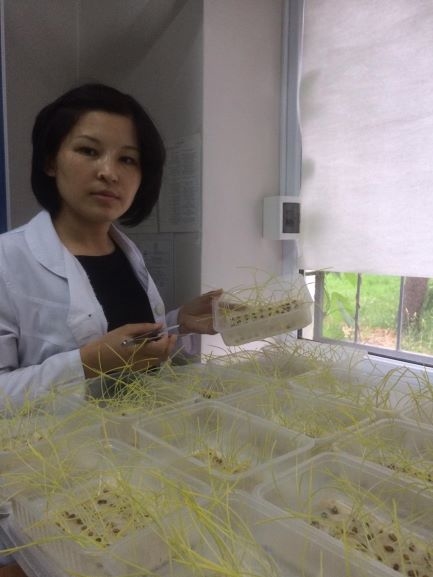
Scientists of “National Agrarian Science and Educational Center” JSC subsidiary – “Zh. Zhiyembaev Kazakh Research Institute for Plant Protection and Quarantine” LLP talked about the importance of phyto-examination for seeds of agricultural crops. The speaker of the online consultation was Umiraliyeva Zhansaya Ziyatkhanovna, who is acting Head of Phytopathology Laboratory.
The yield and quality of crops, first of all, depends on the quality of the initial sowing and planting materials. High seed quality improves the quality of the offspring grown from these seeds.
Seed quality assessment is based on certain indicators, namely: germination and purity. The purity analysis establishes the percentage of pure seeds of the main culture to the weight of all seeds with impurities of dead and living litter.
Seeds can show high germination, which characterizes the general vital activity, and bear the causative agent of the disease, which, without directly affecting the germination of seeds, can subsequently infect crops and cause crop losses.
Sowing with infected seeds entails the transmission of infection to crops during the growing season and causes infection of the new crop. Transmission of infection with inoculum leads to the accumulation of pathogens in the soil from year to year (almost all flax diseases). The exchange of seeds, importation and transfer, if appropriate measures are not taken, contribute to the introduction and widespread resettlement of both unknown and common painful to new areas.
The harmfulness of a fungal infection directly on the seeds is manifested in a decrease in germination, the appearance of weak shoots or diseased plants with reduced viability. As a result, crop shortages and deterioration in the quality of seed and processed products may result.
“Phyto-examination of seeds is a very important technique, which allows the agronomist of the peasant farm to control the state of the seed stock, determine not only the rate of sowing of seeds, but also choose the right plant protection products. The phyto-examination for seed contamination carried out in time will reduce the risks of financial losses and get the expected result,” the speaker noted.
According to the FAO, wheat losses from disease alone amount to $ 2.9 billion in the world. In recent years, in Kazakhstan, the percentage of varietal crops has decreased by 35%. Many peasant farms sow unverified grain, which leads to costs during the growing season.
In connection with the foregoing, the laboratory of phytopathology of LLP "Zh.Zhimbaev KazRIPPQ” offer services in conducting not only phyto-examination of seeds, but also in selecting a protective-stimulating composition for each crop.
All analysis is carried out on high-quality proven equipment in an accredited Center for Phytosanitary Laboratory Analysis. Proven methods are applied, as well as state standart GOST.

One of the methods of phyto-examination to determine the sowing qualities and to identify some diseases according to GOST, the wet chamber method


fungal diseases on barley in a nutrient medium

bacterial diseases on flax in a moist chamber.

bacterial diseases on flax in a moist chamber.

fungal diseases on barley in a nutrient medium.

bacterial disease on soybeans in a nutrient medium.


